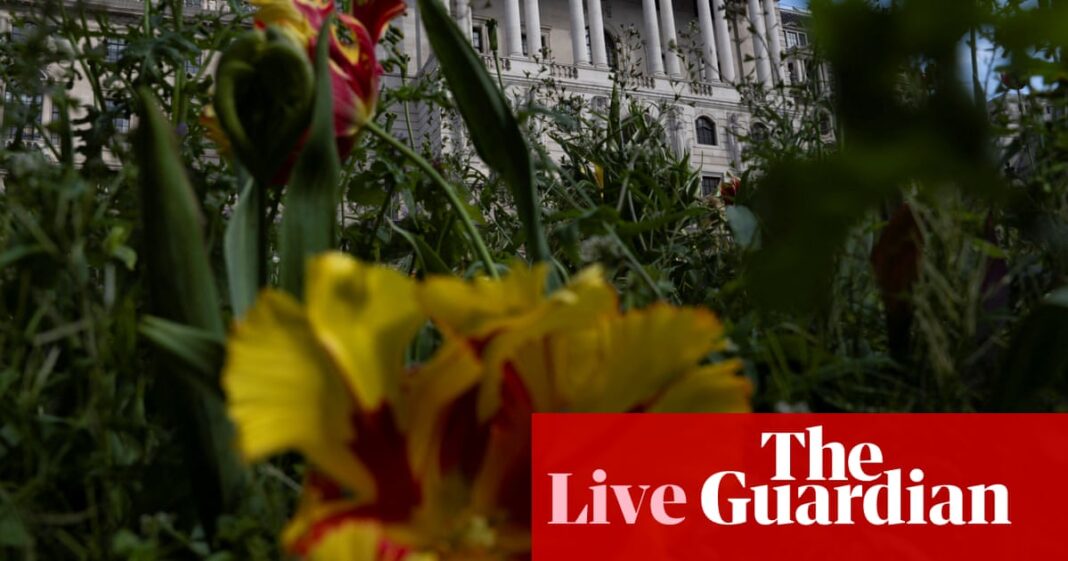Introduction: Bank of England expected to leave interest rates on hold today
Good morning, and welcome to our rolling coverage of business, the financial markets and the world economy.
These are challenging times for central bankers. After steering through the Covid-19 pandemic, and then the energy shock after the Russia-Ukraine war, they must now set monetary policy in the face of an unpredictable trade war, and conflict in the Middle East.
Faced with such uncertainty, the Bank of England is expected to sit on its hands today when it sets UK interest rates.
According to the money markets, there’s a 96% chance that the BoE leaves rates on hold at 4.25% at noon today, and only a 4% possibility of a quarter-point cut (which would bring Bank Rate down to 4%).
Although UK inflation fell last month, to 3.4%, it remains stubbornly above the BoE’s 2% target – and could push higher if the Israel-Iran conflict drives the oil price higher.
Zara Nokes, global market analyst at J.P. Morgan Asset Management (JPMAM), says UK inflation is still “uncomfortably high”, explaining:
Escalating tensions in the Middle East, and the upward pressure this is putting on oil prices, will only add to the Bank of England’s concern about easing rates too quickly.
The Monetary Policy Committee will face a tougher choice when meeting again in August, given the combination of still-sticky inflation and evidence that the labour market is quite clearly cooling. A deterioration in the labour market should, in theory, put downward pressure on inflation, but until there are clear signs of this in the hard data, the Bank should be careful not to claim victory over inflation quite yet, not least because of the uncertain geopolitical climate.”
The Bank has cut rates four times in the last year, having lifted borrowing costs through 2022 and 2023 as it battled inflation. The money markets currently predict it will manage two more quarter-point cuts by the end of 2025.
Last night, America’s central bank left US interest rates on hold, but also lowered its forecasts for economic growth.
Federal Reserve chair Jerome Powell warned that the tariffs imposed by Donald Trump on imports would add to inflationary pressures, saying:
“Increases in tariffs this year are likely to push up prices and weigh on economic activity.
The effects on inflation could be short-lived, reflecting a one-time shift in the price level. It’s also possible that the inflationary effects could be more persistent.”
The UK’s new trade deal with the US should mean Britain is less affected by the global trade war, but as an open economy it would still feel the knock-on impact of trade disruption.
That could mean higher prices, meaning less pressure to cut rate, or lower growth, requiring lower borrowing costs to stimulate
The agenda
-
8.30am BST: Swiss National Bank interest rate decision
-
9am BST: Norges Bank interest rate decision
-
Noon BST: Bank of England interest rate decision
-
Noon BST: Bank of Turkey interest rate decision
Key events
Bank split 6-3 on interest rate decision
Once again, the Bank of England’s nine policymakers were split over how to set interest rates.
Six members voted to leave rates on hold: they were governor Andrew Bailey, deputy governors Sarah Breeden and Clare Lombardelli, chief economist Huw Pill, and external members Megan Greene and Catherine Mann.
Three voted to cut rates to 4% – they were external members Swati Dhingra and Alan Taylor, plus deputy governor, Dave Ramsden.
Lst month, Dhingra and Taylor were the two policymakers who voted for a steeper cut to rates – they’ve now been joined by Ramsden at the dovish end of the MPC.
Bank of England interest rate decision
Newsflash: The Bank of England has left UK interest rates on hold at 4.25%.
The decision, which matches City expectations, comes as the Bank weighs up the risks to the UK economy from US trade wars and the conflict in the Middle East, which has pushed oil prices higher in the last week.
But it’s a split decision – with six of the nine policymaker’s voting to hold, and three voting for a cut.
Details and reaction to follow.
Supermarket chain Morrisons planning £300m more cost cuts

Sarah Butler
Morrisons is aiming to make a further £300m in cost cuts in the next 18 months – raising fears of further job cuts – as the retailer says inflation is driving “subdued consumer sentiment”.
The Bradford-based supermarket chain, which employs 95,000 people in its 500 supermarkets and about 1,700 convenience stores, said it had already exceeded its target of £700m in savings – after cutting about 300 jobs with the closure of cafes, some small stores, florists and hot food counters, and was now aiming for a total of £1bn.
The latest cost cutting plans as Morrisons said sales in established stores rose 3.9% in the three months to 27 April, little more than grocery inflation, and underlying profit, excluding debt repayments, rose 7.2% to £344m.
The group said it was slimming down its range to make it “more focused”, and was putting a “rigorous focus on price” but also adding more world food ranges. It is also hoping to open hundreds more convenience stores in partnership with franchisees.
Rami Baitiéh, the chief executive of Morrisons, said the group had bounced back from disruption caused by a cyber attack on its supplier Blue Yonder late last year: “Against the backdrop of a challenging macro environment, with inflation driving subdued consumer sentiment, value remains at the forefront of customers’ minds.
He said:
“Throughout the first half we’ve worked hard on helping customers through these challenges with a rigorous focus on price, promotions and meaningful rewards for loyalty.”
Ministers stepping up preparations for renationalisation of Thames Water

Jasper Jolly
The environment secretary, Steve Reed, has said the government is stepping up preparations for temporary nationalisation of Thames Water, indicating it will reject pleas from the company’s creditors for leniency from fines and penalties.
Reed told parliament this morning that Thames Water must meet its statutory obligations, after being asked about possible “regulatory easements”.
“Thames Water must meet its statutory and regulatory obligations to their customers and to the environment,” he said, adding:
“It is only right that the company is subject to the same consequences as any other water company.
“The company remains financially stable, but we’ve stepped up our preparations and stand ready for all eventualities, as I’ve said before, including special administration regime if that were to become necessary.”
More here:
Reed’s comments come after The Guardian revealed earlier this month that the creditors had asked for immunity from prosecution for serious environmental crimes in return for taking on the company.
Little chance of UK rate cut today…
The clock is ticking towards noon, when the Bank of England will announce its decision on UK interest rates.
The BoE is still expected to leave borrowing costs unchanged in 30 minutes time, despite the rate cuts we’ve seen in Norway, Switzerland and the Philippines today.
Ronald Temple, chief market strategist at Lazard, says:
Markets are pricing less than a 10% chance of a rate cut from the BoE Monetary Policy Meeting this afternoon. By year end, market prices suggest 53 bps of easing. The BoE will be responding to conflicting economic signals including a weaker-than-expected April GDP reading and sluggish employment metrics while at the same time grappling with surprisingly high inflation.
Observers generally expect the BoE to shift to cutting rates at every other meeting with this afternoon’s meeting offering no policy change.
Professor Costas Milas, of the University of Liverpool’s management school, argues that the Bank of England is in a very tricky situation regarding an interest rate cut at its next scheduled meeting in August.
He tells us:
Following yesterday’s inflation reading of 3.4 per cent (for May), the Bank of England’s policymakers will almost certainly keep Bank Rate at 4.25% today. Many analysts believe that an August interest rate cut is likely, not least because the Bank of England will report, at that time, its new forecasts of the UK economy.
The Bank’s policymakers, however, would like to see inflation (for June) falling below the psychological threshold of 3 per cent in order to consider an August interest rate cut. There is, however, an additional problem. Because of the Israel-Iran war, oil prices have moved above $70, that is, notably higher than the $64-$65 oil price estimate the Bank of England recently used to forecast UK inflation. As things currently stand, and without direct U.S. involvement in the conflict, an interest rate cut is not very likely for August either.
Analysts at Oxford Economics have warned that oil would surge if the Strait of Hormuz were to be closed, which would knock share prices sharply lower.
They explain:
The Middle East conflict adds considerable uncertainty to the outlook for oil prices. So far, supply is unaffected, and we think the modest risk-premium-driven rise is likely to have limited impact on the global economy or risk assets.
However, a further escalation – particularly one which results in the closure of the Strait of Hormuz – would be more damaging. In a scenario where a closure caused the oil price to spike to around $130 per barrel, our macro team projects global growth would be approximately 0.3% below our current baseline in 2026, with world and US CPI inflation peaking at almost 6%. We think equites would sharply sell off in this scenario as investors price in a more stagflationary environment.
However, we wouldn’t anticipate a renewed bear market as the shock is unlikely to be enough to tip the global economy into recession. The lesson from previous geopolitical crises is that the impact on equity markets tends to be short-lived if an economic downturn is avoided.
Norway’s prime minister Jonas Gahr Stoere has welcomed today’s interest rate cut.
Stoere told news agency NTB:
“This is especially good news for everyone with loans.”
ING point out that today’s cut to Swiss interest rates follows a return to deflation in Switzerland.
They explain:
The consumer price index (CPI) fell by 0.1% year-on-year, deviating from the SNB’s inflation target of between 0% and 2%. Since peaking at 3.5% in August 2022, inflation has steadily declined, reaching 0% in April and now moving into negative territory.
he latest decline is largely attributed to external factors. Global energy prices plummeted in May, causing energy inflation to drop by 8.3%. Additionally, the strength of the Swiss franc, which reached its highest level ever in effective terms, significantly reduced the cost of imported goods, which fell by 2.4% year-on-year in May.
Given that imports account for 23% of the CPI basket, this has a substantial impact on overall inflation in Switzerland.
Britain’s tax gap – a measure which estimates how much tax owed was not paid – has widened.
New data from HMRC shows that the UK missed out on £46.8bn of tax liabilities in the 2023-2024 financial year, or 5.3% of the total theoretical tax liabilities.
That’s slightly more than in 2022-23, when the tax gap is estimated to have been £46.4bn – from a slightly wider tax gap of 5.6% of total theoretical tax liabilities.
The data is calculated from estimates of how much excise duty, income tax, national insurance, capital gains, corporation tax and other levies were dodged.
Caitlin Boswell, Head of Advocacy and Policy at Tax Justice UK says HMRC needs more resources to tackle tax evasion:
“The real story here is that the UK’s tax authority doesn’t have the resources or backing it needs to tackle the tax gap which is likely far larger than what is published.
Evidence suggests that the level of tax non-compliance among the super-rich is far higher than estimated, with eye-watering sums of hoarded wealth being held offshore and out of sight of HMRC. Collecting the right tax, to invest in better healthcare, education and social security requires reliable investment and political backing in HMRC.
Instead, the department has to battle fluctuations in staffing resources, has disbanded its unit dedicated to collecting tax from ultra wealthy individuals and is expected to weather real-terms cuts to budgets in the coming years.”
The Norwegian currency has been knocked lower by today’s surprise interest rate cut.
The krone has dropped by 1% against the US dollar, to 10.06 krone to the $.
That underlines that investors had not expected Norges Bank to make its first post-pandemic rate cut today.
Premier Inn owner’s revenue drops in ‘challenging’ market

Lauren Almeida
Whitbread, the owner of hotel chain Premier Inn, has reported a drop in sales as the company struggles against a weak consumer environment and overhauls its restaurant business.
The group, which also owns food chains Beefeater and Brewers Fayre, reported a 5% drop in sales in the UK, led by a 16% drop in its food and beverage division. Its smaller business in Germany performed much better, with sales up 16%, but that was not enough to counter the decline in its home market, with overall sales across the group down 4%.
Richard Hunter, head of markets at the broker Interactive Investor, said while there was little for investors to cheer for in the update, it should be taken in the context of the company’s five-year plan. Last year Whitbread said it would convert 112 of its food and drink sites into hotels, sell 126 unprofitable restaurants, and cut 1,500 jobs.
Hunter said:
“The shares have struggled against the backdrop of a tough consumer environment, especially in the UK, and have fallen by 5.5% over the last year, during which time the wider FTSE100 has seen a 7.8% gain. The group is nonetheless generally well regarded for its prospects and, if achieved, the strategic plan would mark a successful step-change.”
The company told investors on Thursday its property disposals are on track to deliver proceeds of £250m to £300m.
While sales fell in the first quarter, the company emphasised that Premier Inn UK was outperforming its “midscale and economy” corner of the hospitality market. Still, Whitbread shares were down by as much as 2.7% in early trading.


